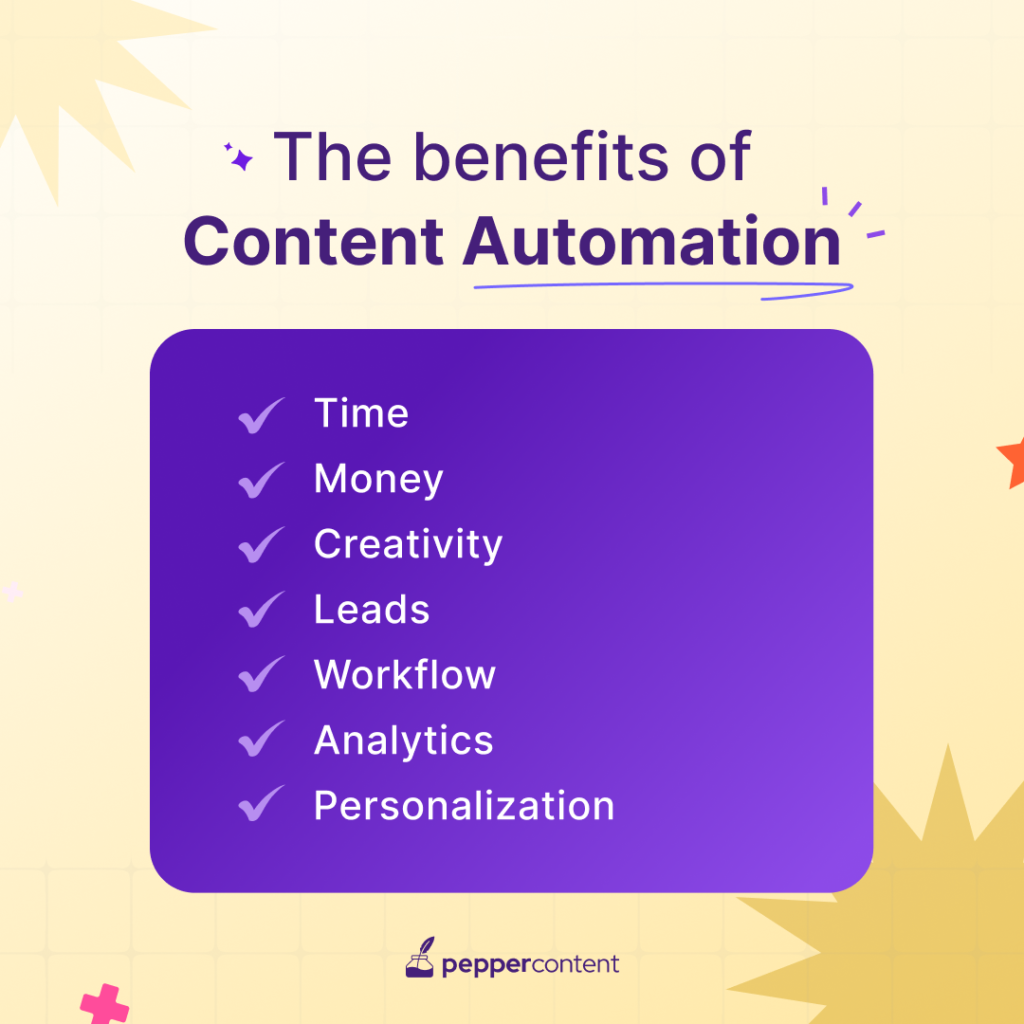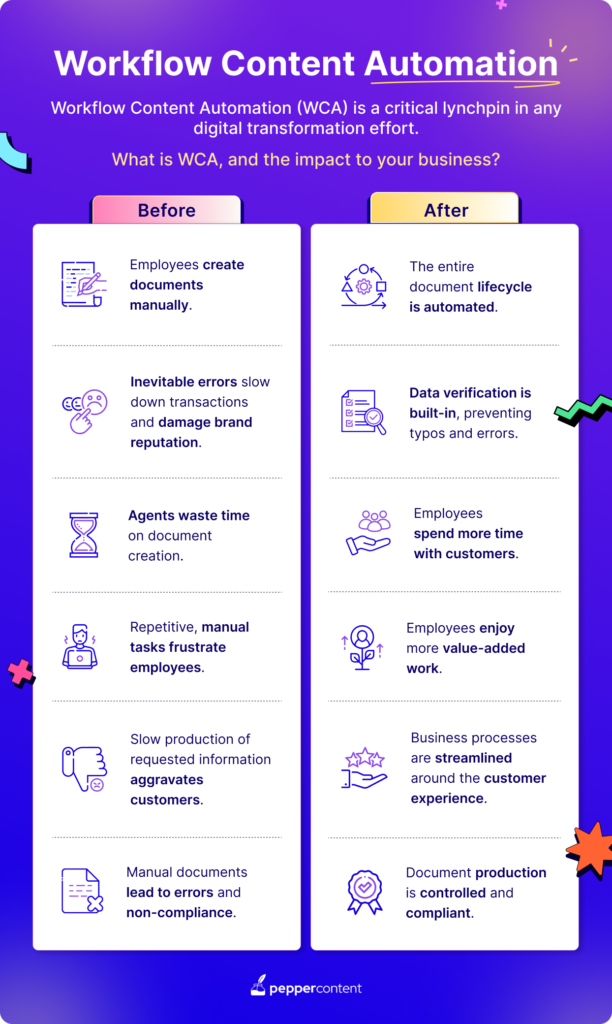Content Automation Done Right: Amplify Your Marketing and Connect Authentically

Let’s face it—content is at the heart of any successful marketing strategy. However, keeping up with creating, managing, and sharing can be stressful. That’s where content automation comes in. The right tools can help you simplify your workload, trim your budget, and keep your brand’s voice consistent across all channels. Plus, it frees you up to focus on what matters—connecting with your audience.
A Quick Guide To Content Automation
Content automation refers to software and tools that can automate some steps involved in content creation and distribution. These include generating content ideas, writing and editing content, scheduling posts, and analyzing performance metrics. Content automation simplifies and expedites the content lifecycle, allowing marketers to focus on strategy rather than execution. Here are some key points you need to know about content automation to get you started.
Why Content Automation Matters

Benefits of Content Automation
1. Efficiency and Productivity
One of the primary benefits of content automation is increased efficiency. Content automation tools allow you to create and schedule posts in advance, ensuring a steady flow of content without constant manual intervention. So, marketers can focus on more strategic activities by automating repetitive tasks like social media posting or email marketing.
2. Consistency across Channels
Maintaining a consistent brand voice across multiple channels is crucial for effective marketing. Content automation tools ensure that your content remains consistent, regardless of the platform. By automating the distribution process, you can ensure that your message is delivered uniformly across all channels, strengthening your brand’s identity.
3. Scalability
As your business grows, so does the demand for content. Content automation allows you to scale your content marketing efforts. Whether you’re managing a blog, social media accounts, or email campaigns, automation tools can help you keep up with the increasing demands of your audience.
4. Enhanced Analytics and Reporting
Understanding the performance of your content is crucial for refining your marketing strategy. Many content automation tools come with built-in analytics and reporting features that provide insights into how your content is performing. These insights can help you optimize your content strategy, ensuring you deliver what your audience wants.

Implementing Content Automation in Your Marketing Strategy
Incorporating content automation into your marketing strategy takes thoughtful planning and execution. Here’s a step-by-step guide to help you get started.
1. Identify Repetitive Tasks
The first step in implementing content automation is to identify repetitive and time-consuming tasks. These could include social media posting, email marketing, or content scheduling. Once you have identified these tasks, you can start looking for the right content automation tools to automate them.
2. Choose the Right Tools
Selecting the right content automation tools is crucial for the success of your strategy. Consider the specific needs of your business, your budget, and the features offered by different tools. Choose tools that integrate well with your existing systems and processes.
3. Create a Content Calendar
A content calendar is essential for organizing and scheduling your content. By planning your content, you can ensure it aligns with your main marketing strategy. Content automation tools can help you schedule and publish content according to your calendar to help you stay on track.
4. Monitor and Optimize
Once you have implemented content automation, monitor the performance of your content. Use analytics and reporting features of your automation tools to track key metrics such as engagement, reach, and conversions. With these insights, you can optimize your content strategy and achieve better results.
Key Content Automation Tools
To fully harness the power of content automation, it is essential to choose the right tools. Here are some of the top content automation tools that can help streamline your marketing efforts:
1. Hootsuite
Hootsuite is a comprehensive social media management tool that allows you to schedule posts, track performance, and engage with your audience across multiple platforms. Its automation features make it easy to maintain a consistent presence on social media without constant manual updates.
2. Pepper Content
Pepper Content’s content marketing platform streamlines content creation with its smart text editor and integrated AI and SEO tools, making it easier to automate content production.
3. HubSpot
HubSpot offers marketing automation tools, including content management, email marketing, and social media scheduling. Its content automation features enable seamless content creation and distribution. It also provides analytics to measure performance.
4. Buffer
Buffer is another popular tool for social media automation. It allows you to schedule posts, analyze performance, and manage multiple social media accounts from a single dashboard. Buffer’s simplicity and ease of use make it an excellent choice for businesses of all sizes.
5. CoSchedule
CoSchedule is a powerful marketing calendar that integrates content planning, scheduling, and automation into one platform. It is useful for teams that need to collaborate on content creation and distribution so that everyone is on the same page.
6. Mailchimp
Mailchimp is a well-known email marketing tool that offers robust automation features. From creating email campaigns to segmenting your audience and analyzing results, Mailchimp helps you automate your email marketing efforts, allowing you to reach your audience more effectively.
Challenges and Considerations
While content automation offers numerous benefits, it has its challenges. Here are some considerations to keep in mind:
1. Maintaining Authenticity
Automation can sometimes lead to a loss of authenticity in your content. It is important to ensure that your content remains genuine and resonates with your audience. Avoid over-automation and ensure that there is a human touch in your content.
2. Staying Relevant
Automated content can become outdated if it is not regularly updated. It is important to review your content periodically to ensure that it remains relevant and accurate. Content automation tools can help with this by providing reminders and updates.
3. Integration with Other Tools
To get the most out of content automation, it’s important to ensure that your automation tools integrate well with other systems and tools you are using. This could include your CRM, email marketing platform, or analytics tools. Proper integration will help streamline your processes and avoid any disruptions.
Content Automation In The Coming Years
Artificial intelligence (AI) and machine learning are already playing a significant role in the development of more advanced automation tools. These technologies will allow for greater personalization and efficiency in content creation and distribution in the future.
1. AI-Powered Content Creation
AI-powered tools are capable of generating content based on specific inputs and guidelines. We can expect these tools to become more sophisticated, enabling marketers to create highly personalized content at scale.
2. Automated Content Curation
Content curation is another area where automation is making significant strides. Tools that can automatically curate and share relevant content from trusted sources are becoming increasingly popular. This not only saves time but also helps establish your brand as a thought leader in your industry.
3. Enhanced Personalization
The future of content automation will also see a greater emphasis on personalization. By leveraging data and AI, automation tools will be able to deliver content that is tailored to individual preferences and behaviors, resulting in more meaningful and effective marketing. As the marketing world keeps changing, staying ahead with content automation is key to staying competitive. Embrace automation, but make sure to blend it with a personal touch to keep your content genuine and engaging for your audience. This approach will streamline your processes and help build stronger connections with your audience.
To take your content game to the next level, give Pepper’s Content Marketing Platform a try by booking a demo now!
Latest Blogs
Explore how Google’s 2025 AI search updates triggered ranking chaos. Learn actionable strategies to adapt your SEO for AI Overviews, zero-click searches, and SERP volatility. Stay ahead now.
Learn how to rank on AI search engines like ChatGPT, Perplexity, and Gemini by optimizing your content for authority, structure, and relevance. Stay ahead in AI-driven search with this strategic guide.
Explore the best healthcare SEO services for your medical practice. Improve online visibility and effectively reach more patients in need of your services.
Get your hands on the latest news!
Similar Posts

Artificial Intelligence
5 mins read
How Free AI Tools for Content Creation Can Boost Your Content Strategy

Artificial Intelligence
4 mins read
AI Content Generators: Making Content Creation Easier for Businesses

Artificial Intelligence
4 mins read